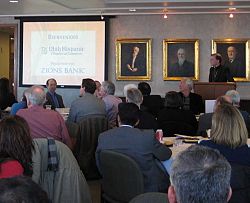Understanding will come from immigrants' stories

by Hilary Leonard SALT LAKE CITY — Emphasizing the need for dialogue and legislative reform, the Most Rev. John C. Wester, Bishop of the Diocese of Salt Lake City, presented a talk on immigration at the Utah Hispanic Chamber of Commerce monthly lunch at Zions Bank Dec. 9. Bishop Wester serves as the Chairman of the United States Conference of Catholic Bishops (USCCB) Committee on Migration. He welcomed members of the Hispanic Chamber of Commerce, including Utah Senator Ross Romero, Senator-elect Luz Robles, Representative Mark Wheatley, and Representative Rebecca Chavez-Houck. Bishop Wester acknowledged "the importance of their role of in society." Bishop Wester spoke of traveling to Bangladesh and being exposed to extreme poverty and seemingly intractable social problems. "How do we resolve these issues?" he asked. One of the first steps, Bishop Wester said is to come together and tell our stories. By hearing the individual stories of immigrants, it becomes possible to better understand why someone chooses to migrate and what they have endured in the process. The Biblical mandate to welcome the stranger and reach out to the alien, Bishop Wester continued, is ancient and has been a foundational principle for followers of the Bible. "All human beings are on a journey," Bishop Wester said. "We can help one another along the way." In contrast to a focus on storytelling and open hospitality, Bishop Wester said many embrace an inflexible perspective on immigration, essentially limited to "You’re illegal. Go home!" This position prohibits the questions and explanations that can make compassion, and reform, possible. The "instinct of hospitality" as Bishop Wester called it, however, pushes us to ask immigrants "Why are you here?" and solicit their stories in order to build common ground. Bishop Wester went on to describe the two principles of the Common Ground Project: 1) No one has a monopoly on the Truth, and 2) Presume good faith. These prerequisites to discussion on immigration shift the model from a punitive legal/illegal binary, to one in which the dignity of individuals is taken into consideration. Bishop Wester went on to outline the specific principles for legislative reform, beginning with the creation of "pathways to legalization, or even citizenship" for those who are now considered "illegal." This could include paying a fine or other stipulations. The second principle fully acknowledges and supports the responsibility of the government to enforce the border. Bishop Wester emphasized that with immigration reform, the border will ultimately become more secure, allowing the government to police human trafficking, drug trafficking, and other dangerous crimes more effectively. The third principle addressed the practical need for the creation of more temporary work visas, as many as hundreds of thousands more, for those seeking work. Bishop Wester added that many of those who migrate do not intend to permanently resettle in the U.S. The fourth principle addressed the separation of families, one of the most painful realities for immigrants today, calling for an emphasis on family unification in immigration proceedings. The fifth principle called for an examination of the root causes of immigration, and social and economic forces that must be addressed, including relieving foreign debt. Finally Bishop Wester called for the restoration of due process. He went to on to speak specifically about SB81, a bill that passed in the 2008 Utah legislature, and will be implemented July 1, 2009. He said while he respects efforts of Utah lawmakers, "SB81 is not the way to do it." Bishop Wester explained that it could further promote a culture of fear and also potentially "push people into the shadows." He urged everyone to contact their elected officials and speak up about what they want in immigration reform. After concluding his talk, Bishop Wester answered questions from the audience about federal legislation, and also about the immediate needs of immigrants living in the Salt Lake area. One man spoke of dangerous housing conditions, while another asked about English- as-a-Second-Language courses at Catholic Churches. Perhaps the most powerful comment came from a woman who shared her personal experiences as an immigrant, and strongly advocated for the inclusion of the Mexican government in immigration reform. "We give so much more to this country than we take," she said. In a final appeal for compassionate dialogue based on steps to reform, Bishop Wester reminded the audience, "These are wonderful human beings. They are our brothers and sisters."
© Copyright 2024 The Diocese of Salt Lake City. All rights reserved.

Stay Connected With Us